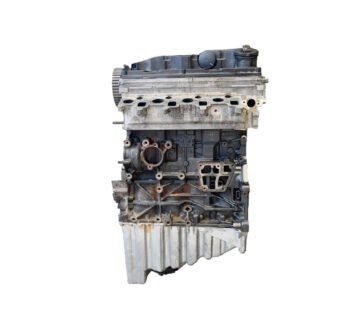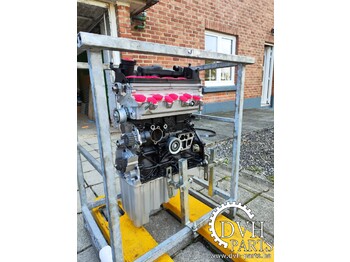Shop the current Amarok Engine for Sale-- Exceptional Rates and High-Quality Engines
Shop the current Amarok Engine for Sale-- Exceptional Rates and High-Quality Engines
Blog Article
Navigating the Refine of Engine Option: Trick Factors to Take Into Consideration
The procedure of engine choice is a complex endeavor that demands careful analysis of a number of essential factors to make sure placement with operational objectives. Performance requirements, fuel performance, and budgetary restrictions are simply the start; considerations around ecological effect and maintenance assistance play an essential role in the decision-making framework. Comprehending just how each of these elements connects can substantially affect the performance and durability of your financial investment. Nevertheless, the complexities of each factor may not be promptly evident, motivating more assessment of just how to purposefully navigate this facility landscape.
Performance Demands
When selecting an engine, it is crucial to develop clear efficiency demands that straighten with the intended application. Efficiency demands include a variety of variables, consisting of power result, torque attributes, and responsiveness, which need to be customized to the specific demands of the car or equipment concerned.
Power result, typically determined in horse power, establishes the engine's ability to move a lorry or perform a job effectively. Torque, on the other hand, is vital for applications requiring solid first acceleration or heavy training abilities. An understanding of the functional setting is also essential; as an example, engines developed for off-road applications might need various efficiency characteristics contrasted to those planned for highway usage.
Moreover, think about the functional lots and responsibility cycle, as these elements influence the engine's long life and reliability. In high-load scenarios, a durable engine style may be necessary to avoid early wear or failure. Furthermore, performance requirements should additionally incorporate factors to consider for exhaust requirements and governing conformity, specifically in regions with rigid ecological laws. By specifying these performance parameters early in the choice procedure, stakeholders can make informed decisions that enhance total functional efficiency and effectiveness.
Fuel Effectiveness Considerations
While performance demands are crucial, fuel performance is just as essential in the engine selection procedure, as it straight influences operating expense and ecological sustainability. Fuel-efficient engines take in much less gas each of work executed, which not only decreases total expense but also reduces greenhouse gas discharges. As organizations progressively prioritize sustainability, selecting an engine that optimizes gas effectiveness can improve company obligation and compliance with ecological guidelines.
When examining fuel effectiveness, it is vital to take into consideration the engine's style and innovation - amarok engine for sale. Technologies such as turbocharging, direct gas injection, and hybrid systems can dramatically boost gas economic climate. Furthermore, understanding the operating problems and responsibility cycles of the engine application is crucial; engines may perform differently under varying lots and speeds
Furthermore, manufacturers typically supply gas consumption information that can be utilized to compare numerous engine alternatives. It is suggested to evaluate these specifications in real-world situations to make sure precision. Finally, the kind of gas made use of can additionally influence fuel efficiency; different fuels may offer better performance and reduced emissions. In recap, fuel performance is a multi-faceted factor to consider that requires complete examination during the engine selection procedure.
Spending Plan and Price Evaluation
Spending plan and expense evaluation works as an important element in the engine choice process, affecting both short-term financial investments and long-lasting functional expenses. When reviewing potential engines, it is necessary to take into consideration not just the preliminary acquisition rate but likewise the total cost of possession, which encompasses installment, upkeep, gas consumption, and prospective downtime.
A thorough evaluation must start with the upfront costs connected with the engine, including required modifications or supplementary equipment. Focusing solely on preliminary expenditures might lead to illinformed decisions. Assessing operating prices over the engine's lifespan is equally important, as extra costly engines may supply superior gas efficiency or minimized upkeep demands, inevitably resulting in cost savings.

Ecological Influence Factors
Comprehending environmental impact aspects is important in the over at this website engine choice procedure, as sustainability considerations have become increasingly crucial for both regulatory conformity and corporate responsibility. Organizations should review the emissions produced by different engine kinds, consisting of carbon dioxide, nitrogen oxides, particle issue, and unburned hydrocarbons. These discharges contribute substantially to air contamination and climate modification, necessitating a cautious analysis of the engine's eco-friendly impact.
In addition, gas type plays an try this site essential role in ecological influence. Engines powered by sustainable power sources, such as biofuels or hydrogen, tend to have a lower environmental impact contrasted to typical nonrenewable fuel sources. In addition, the lifecycle evaluation of the engine, from manufacturing via operation to disposal, must be taken into consideration to recognize the full range of its environmental effects.

Maintenance and Assistance Options
When choosing an engine, the accessibility of upkeep and assistance options is an essential factor to consider that can considerably affect functional effectiveness and durability. Comprehensive maintenance plans make sure that the engine runs at peak performance and decreases unforeseen downtimes. It is important to review the producer's assistance network, including the accessibility of qualified service technicians and solution facilities.
Evaluating the accessibility of extra components is likewise crucial. A reliable supply chain for components can minimize preparations for repairs and upkeep, therefore boosting general performance. Furthermore, take into consideration the convenience of obtaining technical documentation and training resources, which are important for making sure that workers are fully equipped to manage routine and emergency situation scenarios.
An additional crucial aspect is the guarantee and service arrangements offered by the supplier. Ultimately, an aggressive approach to upkeep and support not only expands the life of the engine yet additionally adds to the general success of the operation.
Verdict
Finally, the procedure of engine selection demands a comprehensive examination of check out this site various important factors, including performance requirements, fuel efficiency, budget constraints, environmental impact, and maintenance support. By carefully analyzing these aspects, educated decisions can be made that line up with functional goals and sustainability goals. Ultimately, a tactical technique to engine option will certainly make certain optimal performance and long life while resolving environmental and monetary factors to consider effectively.
While performance demands are vital, fuel efficiency is just as important in the engine option process, as it directly affects operating costs and ecological sustainability. As companies progressively focus on sustainability, selecting an engine that maximizes fuel performance can improve corporate responsibility and conformity with ecological regulations.
Furthermore, understanding the operating problems and responsibility cycles of the engine application is essential; engines may execute in a different way under varying speeds and loads. (amarok engine for sale)
Examining operating costs over the engine's life expectancy is similarly important, as a lot more expensive engines could provide premium fuel efficiency or lowered upkeep demands, inevitably leading to cost financial savings.
In verdict, the process of engine choice requires a detailed assessment of various crucial elements, consisting of performance needs, gas performance, budget plan restrictions, ecological effect, and upkeep support. - amarok engine for sale
Report this page